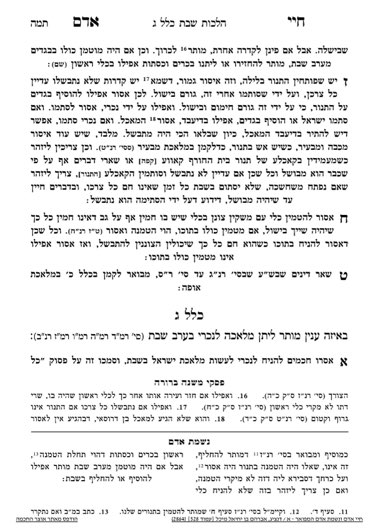We are continuing in siman 7, discussing the halachos of hatmana as they regard an oven. The Chayei Adam writes that if a person leaves fully cooked liquids in the oven (e.g, coffee) that have cooled down, if by opening and closing the oven door they will reheat, it is assur to close the door.
There is a concept of ain bishul achar bishul, once an item is fully cooked, the melacha of bishul does not apply to it. However, this only applies to solids. Regarding liquids, even if the item is fully cooked, if it has cooled down, Ashkenazim are machmir that yeish bishul achar bishul, and it is assur to reheat it. Thus, in our case, if a person opens the oven door, it causes the foods inside to cool down, and when they shut it, it causes the foods to reheat. This is certainly a problem if a food–solid or liquid–is not fully cooked, and is a problem for liquids even if they are fully cooked. If a person does open the oven, they cannot shut it unless the pot is still hot. If the food is raw, they certainly cannot shut it.
In siman 8, the Chayei Adam writes that heating a liquid to yad soledes bo is considered bishul. If it is heated to less than yad soledes bo, it is not bishul.
However, If one wishes to take something cold and submerge it in hot water, even if the water is not yad soledes bo, they are doing hatmana with the hot water. The hot water is considered a mosif hevel, so it is assur both on Shabbos itself and before Shabbos. Therefore, it is assur to submerge cold liquid in warm water.
Furthermore, if the cold liquid is heated to yad soledes bo, there will be a problem of bishul also, since we hold yeish bishul achar bishul for liquids, as we learned above. And in a scenario where there is a problem of bishul, there will be a problem even if the cold liquid is not fully submerged in the hot liquid; meaning, even if there is no issue of hatmana, there can still be an issue of bishul.
(This is the case we mentioned earlier (S0052) where we see the Mishnah Berurah holds it is muttar to partially submerge a food item in a mosif hevel as long as it will not reach yad soledes bo.)
We have reached the end of the halachos of hatmana, but there are other halachos that relate to shehiyah and hatmana which we will discuss in Klal 20.
We need to clarify one point. We learned that when submerging something cold in hot water, if it is completely submerged, it is a problem of hatmana, and if it is not completely submerged, it is muttar. If the cold food does not reach the top of its container, such that there is a gap in the container of the cold food, we need to discuss whether we go after the food, and consider the food completely submerged, or whether we go after the container, and since the top part of the container is not submerged, there is no problem of hatmana. We will discuss this question in the next shiur, be’ezras Hashem.
Summary
- Ashkenazim are machmir that yeish bishul achar bishul for liquids. Therefore, one must be careful not to close an oven door which will cause liquids which have cooled to reheat to the level of yad soledes bo.
- Similarly, this concern will apply to solids or liquids which are not fully cooked.
- Hatmana can be performed with hot water, even if the water is not yad soledes bo. The water is considered a mosif hevel, so it is assur even before Shabbos.



